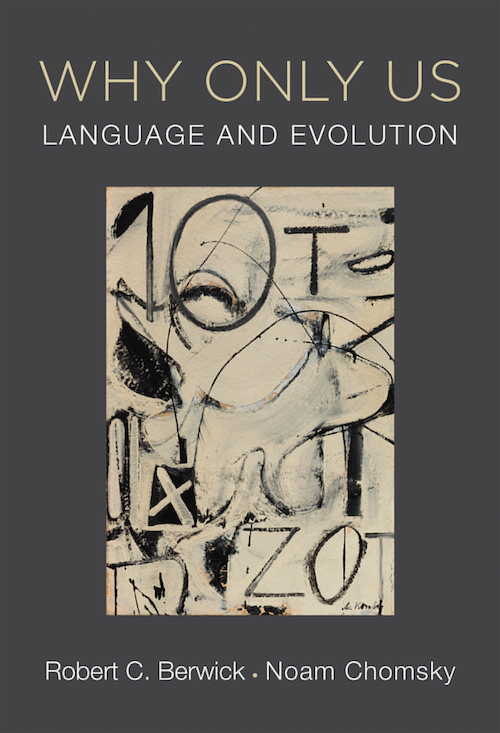 Evolution
Evolution
 Intelligent Design
Intelligent Design
Language as an Evolutionary Conundrum

In Chapter 10 of his new book Evolution: Still a Theory in Crisis, Michael Denton argues for the proposition that language and the higher intellectual faculties — the gifts that uniquely make us human — arose by saltation. In other words, they are gifts — sudden ones. Denton’s view, as he makes clear, has precedents reaching from Alfred Russel Wallace to linguist Noam Chomsky.
In a nice coincidence, Chomsky and MIT colleague Robert C. Berwick are just out with a book of their own, from MIT Press, provocatively titled Why Only Us: Language and Evolution. To be sure, Chomsky and Berwick are not advocates of Denton’s structuralist take on the theory of intelligent design. Still, their own argument for language by saltation is not hard to reconcile with Denton’s view.
The recognition that language poses a problem for Darwinian gradualism is presumably what makes linguist Vyvyan Evans uneasy about the book, which Dr. Evans reviews in New Scientist:
Their argument goes like this. As our capability for grammar is genetically programmed, and as no other species has language, it stands to reason that language emerged fairly suddenly, in one fell swoop, because of a random mutation. This is what the authors refer to as the “gambler’s-eye view” in contrast to a “gene’s-eye view” of evolution. The sudden appearance of language occurred perhaps no more than 80,000 years ago, just before modern humans engaged in an out-of-Africa dispersion.
A sudden “random mutation”…
But to be convinced by this, the reader has to swallow a number of sub-arguments that are debatable at best. For one thing, the authors presume the Chomskyan model of human language — that the rudiments of human grammar (or syntax) are unlearnable without an innate knowledge of grammar. Its position seems less reasonable today that it once did.
Remember, as surly geneticist Dan Grauer formulates the 12th and final of his principles of new-Darwinism (Evolution News pointed this out yesterday), “Homo sapiens does not occupy a privileged position in the grand evolutionary scheme.” A sudden gift, mutation, call it what you will, endowing our ancient ancestors alone with language is thus, on principle, to be disallowed. Language must be shared with other, non-human creatures. And so it is, Evans assures readers.
[R]esearch in primatology and animal behaviour suggests that some of the precursors for language do exist in other species, ranging from European starlings to chimpanzees — with the latter using a sophisticated gestural form of communication in the wild. In fact, gesture may well have been the medium that incubated language until ancestral humans evolved the full-blown capacity for it.
Yet no one would confuse the most eloquent chimp “gestures” with modern sign language. That leaves in place the question of where language, whether communicating through hand or mouth, came from.
The “scientific consensus” cannot accept saltations of such a staggering kind:
Ultimately, Why Only Us is something of a curiosity. It takes a reverse engineering perspective on the question of how language evolved. It asks, what would language evolution amount to if the Chomskyan proposition of universal grammar were correct? The answer is language as a mutation that produces a phenotype well outside the range of variation previously existing in the population — a macromutation. This flies in the face of the scientific consensus. Indeed, the book attempts to make a virtue of disagreeing with almost everyone on how language evolved.
Evans makes an interesting point. If the sudden mutation occurred in one person, it would provide no benefit since there would be no one to talk to. Did the “random mutation,” the gift, then occur in a pair of individuals, living in the same time and place? Don’t even think of going there. All parties to the argument are agreed on that. Evans:
The reader is asked to swallow the following unlikely implication of their logic: language didn’t evolve for communication, but rather for internal thought. If language did evolve as a chance mutation, without precedent, then it first emerged in one individual. And what is the value of language as a communicative tool when there is no one else to talk to? Hence, the evolutionary advantage of language, once it emerged, must have been for something else: assisting thought.
For the spectator, it’s not without pleasure to see evolutionists going at each other this way. Evans accuses Chomsky and Berwick of “reverse engineering” — but more orthodox Darwinian “perspectives” do the very same thing. They assume the negation of the human exceptionalist view and impose that principle, as Evolution News suggested, on whatever is observed.
Every take on the origin of language that leaves the creative work entirely to one or more “random mutations” is doomed. We will be excerpting Denton’s Chapter 10 in good time. Stay tuned.
Editor’s note: Get your copy of Evolution: Still a Theory in Crisis now. For a limited time, you’ll enjoy a 30 percent discount at CreateSpace by using the discount code QBDHMYJH.
